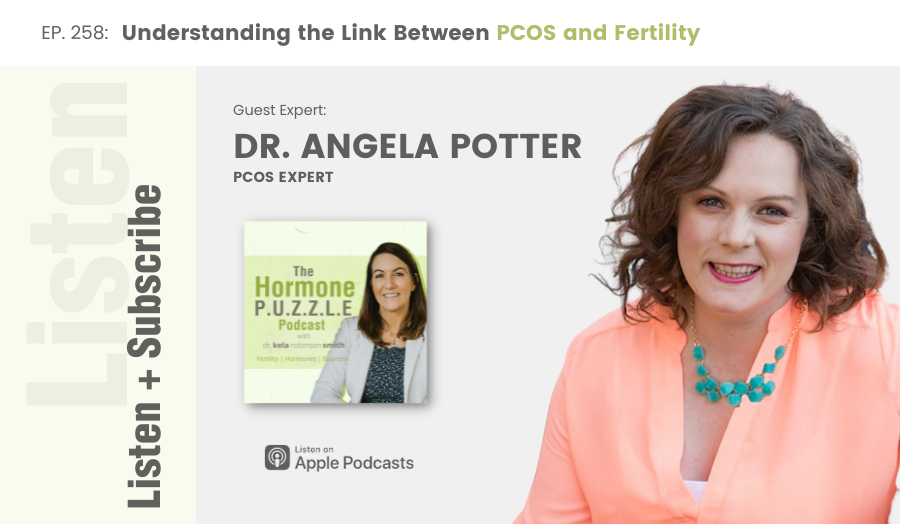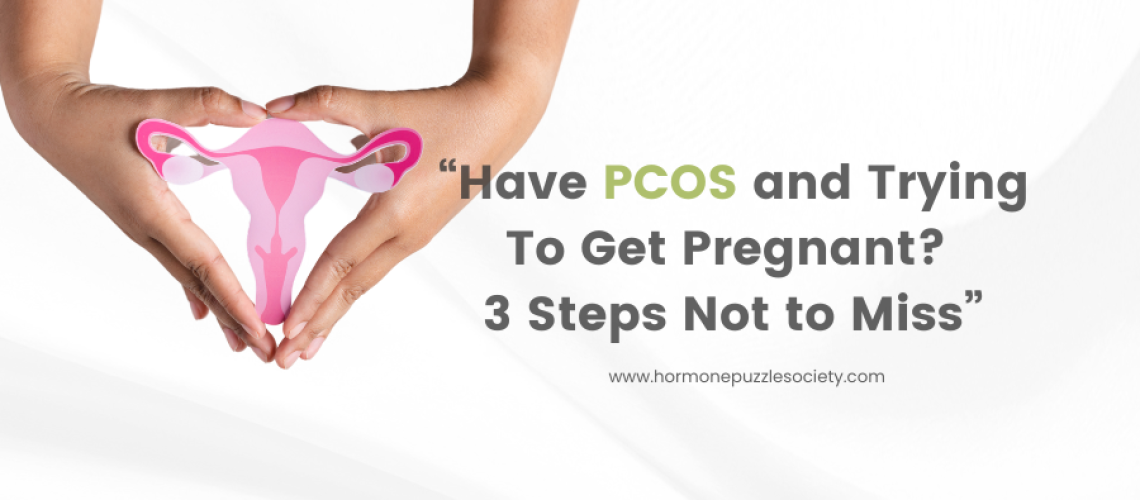Do you have PCOS and are you trying to get pregnant? Have you been to your gynecologist and she literally says, “you’re infertile and the only way to treat your PCOS is to get back on birth control”?
Talk about unhelpful. And getting dismissive advice like that also leaves you feeling broken, fed up and feeling like you’re failing as a woman. Am I right?
When you have PCOS, you need hope. You need a plan that can give you straight forward fertility advice to help you get pregnant.
Well thank goodness you are here because that’s exactly what I’ve got for you today. These three steps are going to help you know what direction to take in order to help your body have the best chance at making a baby.
But before we get into the steps, let’s talk about why there is so much misinformation about PCOS and fertility out there. Well, for starters, PCOS not only affects your baby-making abilities but also your skin, your weight, your periods and your hair (hello! I did NOT know hair could grow there, can someone please show me straight to the laser hair removal salon??).
Let’s use that unwanted hair growth as an example for a minute. Having hair growing all over your body may not seem to directly affect your fertility, but it does when you look under the surface.
That extra hair growth comes from too many androgen hormones (familiar with testosterone? That’s an androgen hormone) running through your body. When too much testosterone is in your body, it stops ovulation.
See, many fertility doctors are focused on jump-starting

ovulation ASAP.
Now of course ovulation is the goal, but if there are other things in the body that are causing you not to ovulate, those need to be addressed first.
What opens up fertility the most is a holistic plan that looks at your complete body. Do you see how a plan that includes addressing your unwanted hair growth, your acne, your painful periods and other issues can help open up many fertility possibilities?
Because once you address what’s keeping you from ovulating then you are taking one more thing away from what’s standing between you and your next pregnancy.
Alright, so now that you know that you need a plan that looks holistically at your health to understand what’s keeping you from getting pregnant, let’s talk about the three steps to take in order to boost your fertility.
3 Vital Steps to Help Get Pregnant With PCOS
Step #1: Get crystal clear on your PCOS diagnosis
Has your doctor explained exactly why you have PCOS? Here’s the thing, PCOS is not a cut and dry diagnosis. In order to be diagnosed with PCOS, you need to have at least two out of three criteria. Understanding which of the two (or if you have all three) is important so you can know what specific areas need to be worked on in your body to help improve your fertility.
If you’re unfamiliar with the criteria, I’ll share them with you. One is having ovulation issues. This means either you’re having long or irregular cycles. Or it can mean that you’ve had an ultrasound or a blood test that shows that you aren’t ovulating.
Another criteria is having cysts on your ovaries. You will know if you have cysts if you’ve had an ultrasound.
And the last criteria is having high androgen hormones. There are simple blood tests that will tell you if you have too much testosterone or DHEA. But also know that some doctors will gauge your androgen levels by the amount of unwanted hair growth you have. That is how closely related extra hair growth is to those elevated androgens.
The benefit of knowing exactly what makes up your diagnosis is that it makes your fertility plan that much more effective. Why? Because each one of these criteria requires a different treatment plan. Lowering the number and size of cysts requires different treatment than getting unwanted hair growth to go away, which is different from restoring ovulation in the body.
Doesn’t it make sense that because PCOS has these different elements to it that it wouldn’t respond well to a one-size-fits-all, cookie-cutter approach? If that’s the kind of approach you’ve been getting so far, that may be why you haven’t been seeing the results you want.
Step #2: Figure out your PCOS type
You’ve gotten clear on your diagnosis, now you are going to take it one step further. You are going to figure out what type (or types) of PCOS that you have.
If you haven’t heard of the PCOS types, that’s okay. I’m going to walk you through it briefly here and also give you some resources to read up on it more.
There are four different types of PCOS. You may fall into just one type, or you may be a mix of all of them, or you may fall anywhere in between. The point is not how many or how few types you fit into, the point is to figure out which type(s) you are.
The categories of the different PCOS types are insulin-resistant, adrenal, inflammatory and post-pill PCOS. Don’t worry if those words don’t make much sense to you now. If you want to read up more about each type and what would make someone fit into each type or not, then listen to my podcast episode with Dr. Kela, or head over and read my Ultimate Guide to PCOS Fertility blog post here.
I do also recommend you work with a PCOS specialist to help you figure out which type you are. Because what’s so important about figuring out which PCOS type that you are? Well, each type requires a different treatment plan. You need to know which type you have so that your fertility plan becomes more individualized to your unique needs. No cookie cutter approach here!
Okay, so you know exactly why you were diagnosed with PCOS and you also know which type (or types) of PCOS that you have. Doesn’t that feel really good to have this concrete information about what your body is doing? Now, on to step three.
Step #3: Check for other imbalances that impact fertility
You may be picking up on this, but let’s just get it out in the open, PCOS fertility is not just your lady-parts! And finding imbalances in your body are going to help you uncover other areas that are keeping you from getting pregnant.
So far, we’ve focused on how figuring out your PCOS diagnosis and types are key to understanding ovulation hurdles in your body. But understanding other hormones and how they interact with your fertility is just as important. And the biggest one to pay attention to is the thyroid.
Thyroid issues are the number one side-kick that I see with PCOS fertility. I can’t tell you how many times I see someone with an under-active thyroid who is trying to get pregnant.
Thyroid hormones are so important in the fertility journey because they interact directly with the ovaries to help with egg quality and growth. Any issues with the thyroid are going to affect fertility.
Ask your doc if they are ordering thyroid labs for you. You may be working with a fertility-savvy doctor already and they know all the tests to order. But if not, you’re going to need to advocate for yourself. Why? Because most docs are ordering only a TSH test to evaluate thyroid function. This is a big mistake. You need to have a comprehensive thyroid evaluation (don’t be overwhelmed by my use of “comprehensive”, it is just a set of lab tests that means more than just the TSH test) that especially includes thyroid antibodies. Your TSH may be normal but you can still have positive antibodies. Those antibodies are causing inflammation in the body and can alter your hormones and negatively affect your fertility.
So not only are your thyroid hormones potentially getting in the way of having a baby, but also these pesky thyroid antibodies and you need to know if it’s an issue for your body and your fertility.
Okay, let’s sum this up. First off, you want to get clear on what makes up your PCOS diagnosis. Next, you are going to figure out which type (or types) of PCOS you have. After that? You are going to check for other imbalances that may be keeping you from getting pregnant.
Do you see how having this information sets you up for a rock-star fertility plan moving forward?
If you’ve been going to your doctor and all you do is walk out with a pamphlet and a medication, then you are getting a one-size-fits-all approach to PCOS and you need something individualized. Sign up for a FREE PCOS Fertility Breakthrough Session to understand why what you’ve been doing hasn’t been helping you get pregnant and what actually works.
Guest Blogger,
Dr. Angela Potter

Dr. Angela Potter is a functional medicine naturopathic doctor and leading expert in PCOS fertility. She is the creator of the PCOS Fertility Protocol that helps women with an individualized approach to overcoming infertility with PCOS.
P.S. Catch Dr. Angela’s interview in this week’s episode of The Hormone P.U.Z.Z.L.E Podcast – Understanding the Link Between PCOS and Fertility. You can also find the episode on this podcast page as well as Spotify, and Stitcher. Don’t forget to subscribe, follow, and write us a review on Apple Podcast (if you LOVE it).


